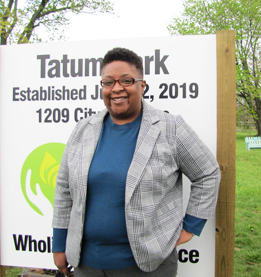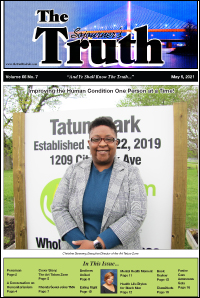By Fletcher Word

Sojourner’s Truth Editor
“Community revitalization” is the goal of the Art Tatum Zone says Executive Director Christine Sweeney of the project centered in the Junction neighborhood and headquartered at the Tabernacle Church where Sweeney serves as First Lady.
The Zone, created in 2018, “exists to create a comprehensive, integrated framework of programs and services that will serve to bring hope and help to children and families,” reads the Mission Statement. And the Zone will accomplish its goals by improving the “human condition one person at a time, one family at a time,” according to its literature.
“We understand the uniqueness of the challenges,” says Sweeney whose attachment to the Junction neighborhood is generational. She is of, by and from Junction – born and reared there, her mother still resides in the community. She is by no means exaggerating when she says she understands the challenges.
A University of Toledo graduate, Sweeney was a teacher with Toledo Public Schools for 19 years before her retirement in November 2020.
The Tabernacle Church, on Pinewood, is a most appropriate location for the Zone’s headquarters and its pastor, Calvin Sweeney, serves as the Art Tatum Zone’s president.
Working with the Sweeneys are Warick Goodwin, Special Projects Management and Staff Development; Kendra Kec, supervisor, Community Learning Center; Aloee Jackson, supervisor, Learn to Earn Program; Andrew Howard, supervisor, Hope Center; Dewey Foster, LTC Business Liaison.
Christine Sweeney and her staff are approaching their goal to improve the human condition by dividing their tasks into six categories – education, economic development, health and wellness, leadership and personal development, neighborhood stabilization, community and family engagement.
In a few short years, the Zone has already established a number of programs designed to make an impact on the community it serves. In the education sector, the Zone has created Community Learning Centers where children can receive in-person assistance, online tutoring and a Learn to Earn program for high school students with an emphasis on developing employment opportunities and career readiness.
In economic development the Zone is partnering with Assets Toledo to develop entrepreneurs in the Junction Neighborhood. In health and wellness, the Zone has set up the Hope Center, which hosts a food distribution operation and provides access to a free medical clinic though a partnership with the University of Toledo Medical Center.
In its leadership program, the Zone is collaborating with Vision International University offering more than 30 certificate and degree programs and in community and family engagement, parenting classes for young and expecting parents.
In its neighborhood stabilization segment, the Zone has a housing repair program and part of that program involves the renovation of the actual former Art Tatum residence on City Park which will clearly be a centerpiece of its repair efforts. Work will begin on the structure in late May starting with the foundation and should be open to visitors in a year’s time.
Critically, in this age of community programs operating as individual entities, Sweeney and her board are striving to avoid that tendency to operate in a silo – collaboration is the key to their future success, she says.
The partnership with Assets Toledo, she explains, will help “get the barbers out of the basement and the cooks out of the kitchen” and into the Junction Neighborhood to open and expand their businesses.
The Zone, as an example, is not only working with Local Initiatives Support Corporation (LISC) to help support micro businesses, but also making a macro effort to bring big businesses, such as Pharma, into the Neighborhood.
“We have industrial space in the neighborhood which can help bring economic financing into the area,” says Christine Sweeney. “We are working with the state and federal governments to do the leg work and make it happen.”
Those collaborative efforts also extend to other community groups in the area, says Sweeney. She sees the Zone’s work as complementary, for example, to that of the Junction Coalition and its executive director, Alicia Smith. “We have laid out a framework adjacent to her work,” says Sweeney, comparing the housing stock and safety emphasis of the Coalition’s work to the family and children emphasis of the Zone.
“Sister Ginny is one of our favorite people,” says Sweeney of Sister Virginia Welsh who runs the Padua Center. “Her work is aligned and collaborative,” she adds noting that the Zone has worked with the Padua Center to provide remote learning center and has referred people there on numerous occasions.
“We are not growing our organization for the sake of our organization,” says Sweeney, emphasizing how completely open the Zone is to collaboration and how its focus is on the Junction Neighborhood and its residents, not in becoming a city powerhouse agency.
To that end, she notes that how important it is that residents should feel safe, should have economic self sufficiency and should have good health. “That should be the expectation for all neighborhoods.”

